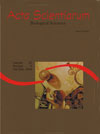Morpho-anatomical alterations in plants of <em>Lithraea molleoides<em> (Vell.) Engl. submitted to flooding
Abstract
Flooding effects in Lithraea molleoides plants were studied. Young plants were kept under drained and flooded soil over a period of 35 days. For growth and development analyses, the length and diameter of stem and main root and the dry weight of roots, stem, and leaves were measured. For anatomical studies, sections of fresh and fixed roots, stem bases and leaves were made using standard procedures in vegetal anatomy. The stress reduced the dry weight increment of plants without causing the death of roots or the abscission of leaves. In the stem base, flooding induced the hypertrophy of lenticels and the increase of intercellular space and reduction lower starch contents, in the cortex. Plants flooded displayed greater percentage of cortical intercellular space in the secondary roots and lower investment in secretory structure formation in the stem base. It can be suggested that flooding reduced the recourses allocation to growth. These recourses could be used in morphological alterations, such as hypertrophied lenticels and increase of intercellular spaces, that could contribute to plants survival during stress period, probably, due maintenance of aerobic respiration.Downloads
Download data is not yet available.
Published
2007-11-16
How to Cite
Medri, M. E., Ferreira, A. C., Kolb, R. M., Bianchini, E., Pimenta, J. A., Fabro, V. M. D., & Medri, C. (2007). Morpho-anatomical alterations in plants of <em>Lithraea molleoides<em> (Vell.) Engl. submitted to flooding. Acta Scientiarum. Biological Sciences, 29(1), 15-22. https://doi.org/10.4025/actascibiolsci.v29i1.408
Issue
Section
Botany
DECLARATION OF ORIGINALITY AND COPYRIGHTS
I Declare that current article is original and has not been submitted for publication, in part or in whole, to any other national or international journal.
The copyrights belong exclusively to the authors. Published content is licensed under Creative Commons Attribution 4.0 (CC BY 4.0) guidelines, which allows sharing (copy and distribution of the material in any medium or format) and adaptation (remix, transform, and build upon the material) for any purpose, even commercially, under the terms of attribution.
Read this link for further information on how to use CC BY 4.0 properly.
0.6
2019CiteScore
31st percentile
Powered by 

0.6
2019CiteScore
31st percentile
Powered by 












1.png)




3.png)













